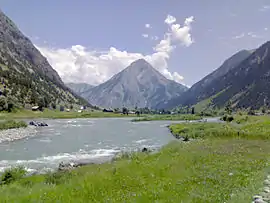| Habba Khatoon | |
|---|---|
| The Nightingale of Kashmir | |
| Empress Consort of Kashmir | |
| Tenure | 1579 – 1586 |
| Born | Zoon 1554 Chandhara, Pampore, Kashmir |
| Died | 1609 (aged 54–55) Kashmir |
| Burial | Athwajan, Kashmir |
| Spouse | |
| Issue | At least 1 (daughter)[1] |
| House | Chak Dynasty |
| Father | Abdi Rather[1] |
| Mother | Janam[1] |
| Writing career | |
| Occupation | Poet |
| Language | Kashmiri |
| Subject | Poems and songs about loss and separation |
| Years active | c. 1570 – 1609 |
| Notable works | Loal |
Habba Khatoon (born Zoon; 1554–1609; sometimes spelled Khatun), also known by the honorary title The Nightingale of Kashmir,[2] was a Kashmiri Muslim poet and ascetic in the 16th century.
Biography
She was born in a small village in Chandhara (Kashmiri: Tsandhor). Pampore, Pulwama in Kashmir. Her real name was Zoon or Zuni (Kashmiri: زوٗن, romanized: zūn, lit. 'Moon').[3] According to the oral tradition, she was called Zoon because of her great beauty. Although a peasant, she learnt how to read and write from the village Alimah.
According to legend, one day Yousuf Shah Chak, the last independent emperor of Kashmir, was out hunting on horseback. He heard Zoon singing under the shade of a chinar tree, and the couple met and fell in love. The oral tradition describes Zoon as Yousuf Shah Chak's queen consort, although there is scholarly debate about whether she was in fact a lower status mistress or member of his harem.[4] She entered the palace in about 1570, and at some point changed her name to become Habba Khatoon (Kashmiri: حَبہٕ خوتوٗن).
The couple were reportedly very content, and Yousuf Shah became the ruler of Kashmir. However, they were separated in 1579 after the Mughal emperor Akbar had Yousuf Shah arrested and imprisoned in Bihar, never to return. After this, Habba Khatoon became an ascetic,[5][6] and spent the rest of her life wandering across the valley singing her songs.
Habba Khatun composed songs in Kashmiri. It is claimed that she introduced "loal" to Kashmiri poetry, "Loal" is more or less equivalent to the English 'lyric'. It conveys one brief thought. Braj Kachru states that Habba Khatun and Arnimal "perfected the loal form of Kashmiri poetry".[7] The themes of her poetry can be categorized into two main strands that reflect significant events in her life. The period following her liberation from an oppressive marriage extensively delves into the concept of freedom. The second phase, which commenced after her separation from Yousuf Shah Chak, is characterized by poems brimming with emotions of separation, romantic expressions, and a sense of melancholy. [8]
There is some dispute about the historical accuracy of Habba Khatun's biography, however the songs associated with her (including Mea ha keir tsei kith and Tse Kamiu Soni Meani) are widely popular across Kashmir. Her songs are frequently mournful and full of the sorrow of separation. Her tomb lies near Athwajan (English connotation: Handful of Rings) .[5]
Legacy

An underpass in Mughalpura, Lahore has been named after Habba Khatoon. The Indian Coast Guard named the ship CGS Habba Khatoon after her.
Habba Khatoon (1978) is an Indian Kashmiri-language television film directed by Bashir Badgami for Doordarshan. It starred Rita Razdan in the titular role of the queen.[9][10] Doordarshan also aired Habba Khatoon, another television show in Hindi on DD National about the poet.[11]
Mrinal Kulkarni portrayed her role in the Indian television series Noorjahan, which aired on DD National from 2000-2001.
Zooni is an unreleased Indian Hindi-language film by Muzaffar Ali that was supposed to release in 1990 but was eventually shelved. Earlier unsuccessful attempts in Indian cinema to portray her life on screen included one by Mehboob Khan in the 1960s and in the 80s by B. R. Chopra.[9]
See also
References
- 1 2 3 4 Kavita Bhargava (3 June 2000). "A grave mistake". The Tribune.
- ↑ "Mystic Mantra: Habba Khatoon – The Nightingale of Kashmir". www.deccanchronicle.com. Retrieved 27 June 2022.
- ↑ Kachru, Braj Behari (1981). Kashmiri literature. Harrassowitz. ISBN 3447021292. OCLC 1014524295.
- ↑ Sadhu, S. L. (1983). Haba Khatoon. ISBN 9788126019540. OCLC 1007839629.
- 1 2 "A grave mistake". The Tribune. 3 June 2000. Retrieved 10 March 2013.
- ↑ Kalla, Krishan Lal (1985). "19. Nightingale of Kashmr". The Literary Heritage of Kashmir. Mittal Publications. p. 21.
- ↑ Kachru, Braj Behari (1981). Kashmiri literature. Harrassowitz. ISBN 3447021292. OCLC 1014524295.
- ↑ https://feminisminindia.com/2023/01/19/habba-khatoon-the-greatest-poet-and-peasant-queen-of-kashmir-indianwomeninhistory/
- 1 2 Bali, Karan (30 June 2017). "Incomplete Films: Zooni". Upperstall.com.
- ↑ "Current breed of film-makers lack passion: Bashir Budgami". Tribune India. 20 April 2016.
- ↑ Archived at Ghostarchive and the Wayback Machine: "Habba Khatoon - Episode 01". Prasar Bharati Archives. 29 August 2017.
Sources
Further reading
- Wakhlu, S. N. (1994). Habba Khatoon: the nightingale of Kashmir. South Asia Publications. ISBN 8174330054.
Peer babaPeer Baba on Razdan top